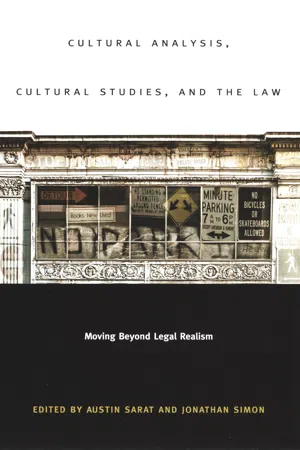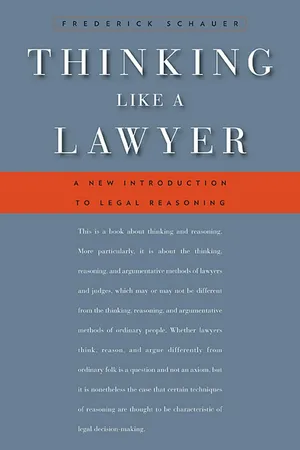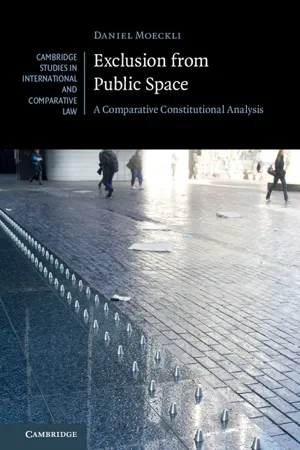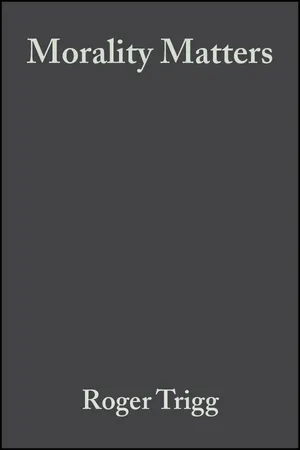Law
Legal Rules
Legal rules refer to the established principles and regulations that govern behavior within a society. They are created and enforced by a governing authority, such as a government or legal system, and are designed to maintain order and justice. Legal rules encompass a wide range of areas, including criminal law, civil law, and administrative law.
Written by Perlego with AI-assistance
Related key terms
1 of 5
5 Key excerpts on "Legal Rules"
- eBook - PDF
Cultural Analysis, Cultural Studies, and the Law
Moving Beyond Legal Realism
- Austin D. Sarat, Jonathan Simon, Austin D. Sarat, Jonathan Simon(Authors)
- 2003(Publication Date)
- Duke University Press Books(Publisher)
The logical relations between these specialized meanings give it an in-ternal order, a way to classify cases into actionable categories. These categories, because they are definitionally derived, are answerable only to their internal Rules of Law, Laws of Science / 221 logic, not to the specific features of actual disputes. They capture those specific features only imperfectly, sometimes not at all. They are integral and unassail-able, but hollowly so. In the emphatic words of Karl Llewellyn, ‘‘Legal Rules mean, of themselves, next to nothing. They are verbal formulae, partly convey-ing a wished-for direction and ideal. But they are, to law students, empty.’’ ≤ Felix Cohen was even more blunt. Jurisprudence, as the decisional rules between linguistic entities, ‘‘is a special branch of the science of transcendental non-sense.’’ ≥ Of course, as the realists were the first to remind us, transcendental non-sense can wield enormous power in the world. What gives it this power is, in part, a popular conception of law, honoring it for the very thing that makes it nonsensical to the realists. Law, popularly understood, is an adjudicative vehi-cle generalized and preexisting, a whole cloth already in place in advance of any application to specific cases. Jerome Frank summarized this view as follows: Law is a complete body of rules existing from time immemorial and un-changeable except to the limited extent that legislatures have changed the rules by enacted statutes. Legislatures are expressly empowered thus to change the law. But the judges are not to make or change the law but to apply it. The law, ready-made, pre-exists the judicial decisions. ∂ Law, in the minds of most laymen and most lawyers, enjoys a sequential privilege. It is anterior to what it adjudicates. All its necessary provisions are either already there or deducible from what is there. - eBook - PDF
- Gianluigi Palombella, Neil Walker, Gianluigi Palombella, Neil Walker(Authors)
- 2008(Publication Date)
- Hart Publishing(Publisher)
The interrelationships between official ‘rules for decision’, as Ehrlich called them, and ‘living law’ are complex and variable, but there is no reason to believe that ratch-eting up the formal rationality of the former will produce its direct and faithful reflection in the latter. Again, Joseph Raz gives one ‘fairly obvious’ reason for preferring rules to principles in the direct regulation of behaviour as being that ‘Principles, because they prescribe highly unspecific acts, tend to be more vague and 52 This argument is developed at greater length in my ‘Ethical Positivism and the Liberalism of Fear’, in T Campbell and J Goldsworthy (eds), Judicial Power, Democracy and Legal Positivism, (Aldershot: Ashgate, 2000) pp 73–7. It gains further, even poignant, support from analyses then unknown to me that suggest the common law is superior to civil law in supporting economic growth: see FB Cross, ‘Identifying the Virtues of the Common Law’ (http://papers.ssrn.com/sol3/papers.cfm?abstract_id=812464), and the references cited there. 53 See his Fundamental Principles of the Sociology of Law, with original introduction by R Pound and a new introduction by KA Ziegert (New Jersey, NJ: Transaction Publishers, 2002), first published in English 1936, and in German 1913. The Rule of Law: Legality, Teleology, Sociology 63 less certain than rules’, and ‘Since the law should strive to balance certainty and reliability against flexibility, it is on the whole wise legal policy to use rules as much as possible for regulating human behaviour because they are more certain than principles and lend themselves more easily to uniform and predictable application’. 54 On that assumption, numerous advocates of the rule of law insist that it should be a ‘law of rules’, 55 where rules are understood to act as ‘exclusionary reasons’, 56 rather than more open-ended principles, since the former are assumed to be more certain and predictable than the latter. - eBook - PDF
Thinking Like a Lawyer
A New Introduction to Legal Reasoning
- Frederick Schauer(Author)
- 2009(Publication Date)
- Harvard University Press(Publisher)
2 R U L E S — I N L A W A N D E L S E W H E R E 2.1 Of Rules in General Reasoning with rules is perhaps the most common image of what lawyers and judges do. A widespread popular conception has it that lawyers ar-gue their cases by appealing to abstruse rules not understandable by ordi-nary people, and that judges make their decisions by consulting books full of such rules. Having found the right rule, so it is thought, the judge proceeds to apply it mechanically to the case at hand, and that is the end of the matter. Legal sophisticates commonly mock this image, which strikes insiders to the law as being far removed from the realities of actual practice. And for a host of reasons it is, not least being that most controversies or events involving a straightforward application of existing rules will not wind up in court at all. 1 But for all the inaccuracies and exaggerations built into this ubiquitous caricature of what lawyers and judges do, it nevertheless captures a genuinely important part of law. Rules actually do occupy a large part of law and legal reasoning. Lawyers frequently consult them, and judges often make decisions by following them. Law may not be all about rules, but it is certainly a lot about rules, from the 13 1. Because straightforward or easy applications of Legal Rules are rarely liti-gated, the cases that come to a court are predominantly and disproportionately ones that are in some way hard. The litigated hard cases thus represent a biased sample of all legal events, a phenomenon typically referred to as the selection effect. See George L. Priest & William Klein, “The Selection of Disputes for Lit-igation,” 13 J. Legal Stud. 1 (1984). We will take up the selection effect and its consequences in the next section of this chapter, and return to it in Chapters 7 and 8. Rule Against Perpetuities in property to the “mailbox rule” in contracts to the felony murder rule in criminal law to the Federal Rules of Civil Procedure to innumerable others. - eBook - PDF
Exclusion from Public Space
A Comparative Constitutional Analysis
- Daniel Moeckli(Author)
- 2016(Publication Date)
- Cambridge University Press(Publisher)
There is broad consensus today, therefore, that any concept of the rule of law must incorporate, at the very least, a number of fundamental formal elements. These minimal requirements, or principles, can be found in all three legal systems at issue. They include the principle of legality; the requirement that laws be public, prospective, general, clear and stable; the principle of formal equality; due process guarantees; and access to justice. Some of these principles are of parti- cular relevance for the present context and are therefore discussed in more detail below. 4.1.7 Link to fundamental rights and democracy It is widely acknowledged that the rule of law is a prerequisite for upholding fundamental guarantees of liberty and equality. The link between the rule of law and fundamental rights is stressed in the pre- ambular passage of the UDHR quoted above, according to which ‘human rights should be protected by the rule of law’. 91 By requiring authorities to act in accordance with laws declared publicly in clear terms in advance, the rule of law enables people to plan and act as autonomous rational beings and thus to exercise their liberties. As Montesquieu put it, ‘liberty is a right of doing whatever the laws permit’. 92 Furthermore, the rule of law forces those in power to articulate their claims in terms of rules that are equally applicable to everyone, both the powerful and the powerless, and, as E.P. Thompson understood, thus renders them ‘prisoners of their own rhetoric’. 93 In this way, the very form of law functions as a crucial 90 See also Pech, ‘The Rule of Law as a Constitutional Principle of the European Union’ (2009); Weber, ‘Rechtsstaatsprinzip als gemeineuropäisches Verfassungsprinzip’ (2008); Carpano, État de droit et droits européens (2005); Fernandez Esteban, The Rule of Law in the European Constitution (1999), pp. 65–101; MacCormick, ‘Der Rechtsstaat und die rule of law’ (1984). - eBook - PDF
- Roger Trigg(Author)
- 2008(Publication Date)
- Wiley-Blackwell(Publisher)
5 The rule of law What Is the Difference between Moral Rules and Laws? Law and morality may be intertwined, but we have seen that they are defi-nitely distinct. Do they function, though, in parallel ways, or are they very unlike each other? Are moral rules in any way like the laws of a land? A crucial difference is that, if such rules have a claim to objective truth, and are related to human nature, they must have a universal application. Laws are local. The laws of England do not apply in the United States, and vice versa, even though they may be derived from the same principles. This distinction fails to operate for a relativist, for whom morality is itself local and conventional. The only distinction, then, between moral and Legal Rules is that the sanctions for breaking the law are codified. There may be shame or reproach when we flout convention, but there are no clearly agreed punishments in the same way. Many would object to any idea of morality being conveyed in a set of rules, to be applied on particular occasions like law. Yet morality cannot be allowed to dissolve into a morass of private decisions, which may ultimately be arbitrary. There has to be a set of standards or principles which apply to my actions, whether or not I happen to abide by them at any one time. The relativist might point to the publicly enforced conventions and habits of society, and we are then not far from the analogy with the law of a particular place. Even in ancient Greece, there were major arguments between those who traced morality to law and custom, the nomos of a particular place, and those who looked to a universal grounding in nature, physis , which by definition was the same everywhere. Can moral principle, even so, be compared in some ways with law? In the case of law itself, there is a difference between the principles underlying it and actual laws. Sometimes such principles are enshrined in a constitution.
Index pages curate the most relevant extracts from our library of academic textbooks. They’ve been created using an in-house natural language model (NLM), each adding context and meaning to key research topics.




